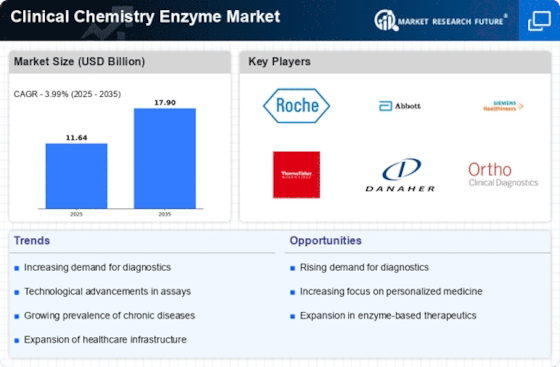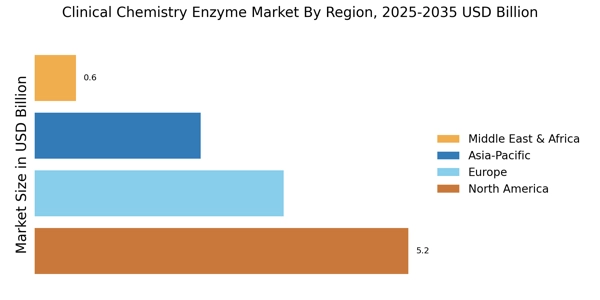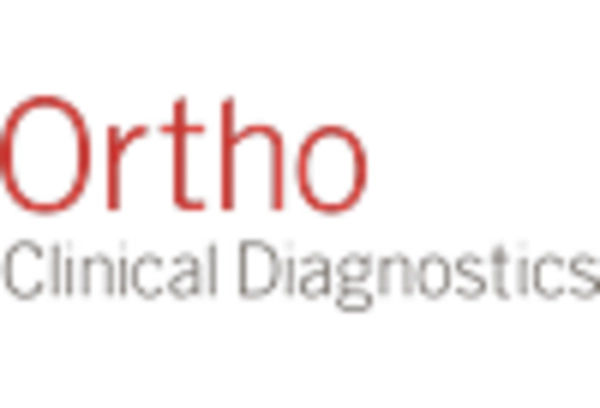Rising Incidence of Metabolic Disorders
The Clinical Chemistry Enzyme Market is significantly influenced by the rising incidence of metabolic disorders, including diabetes and obesity. These conditions often require regular monitoring of enzyme levels to manage and assess treatment efficacy. For example, enzymes such as lipase and amylase are critical in diagnosing and managing pancreatic disorders, which are increasingly prevalent. The World Health Organization has reported a steady increase in metabolic disorders, which is likely to propel the demand for enzyme-based diagnostic tests. As healthcare providers seek reliable methods to monitor these conditions, the clinical chemistry enzyme market is expected to expand, with a projected growth rate of 7% annually over the next five years.
Increasing Focus on Preventive Healthcare
The Clinical Chemistry Enzyme Market is witnessing a growing emphasis on preventive healthcare, which is reshaping the landscape of diagnostics. As healthcare systems shift towards preventive measures, the demand for enzyme-based tests that can identify risk factors for diseases is on the rise. Enzymes play a pivotal role in various metabolic pathways, and their measurement can provide critical insights into an individual's health status. This trend is reflected in the increasing adoption of routine screening tests that utilize enzymes, which is expected to drive market growth. The market is anticipated to reach a valuation of USD 10 billion by 2027, as more healthcare providers recognize the importance of early detection and intervention facilitated by enzyme assays.
Growing Awareness of Enzyme-Based Diagnostics
The Clinical Chemistry Enzyme Market is experiencing a rise in awareness regarding the benefits of enzyme-based diagnostics among healthcare professionals and patients. Educational initiatives and outreach programs are playing a crucial role in informing stakeholders about the advantages of enzyme assays, such as their accuracy, speed, and cost-effectiveness. This heightened awareness is leading to increased adoption of enzyme-based tests in clinical settings, as healthcare providers recognize their value in patient management. Additionally, patient advocacy groups are promoting the importance of regular testing, further driving demand for enzyme assays. The market is expected to grow steadily, with an estimated increase of 5% in the adoption rate of enzyme-based diagnostics over the next few years.
Expansion of Research and Development Activities
The Clinical Chemistry Enzyme Market is benefiting from an expansion in research and development activities aimed at discovering new enzymes and improving existing assays. Academic institutions and biotechnology companies are increasingly investing in R&D to explore novel applications of enzymes in diagnostics. This focus on innovation is likely to lead to the development of more sensitive and specific enzyme assays, which can enhance disease detection capabilities. Furthermore, collaborations between research institutions and diagnostic companies are fostering the creation of cutting-edge technologies that could revolutionize the clinical chemistry landscape. As a result, the market is poised for growth, with R&D expenditures projected to increase by 10% annually, reflecting the industry's commitment to advancing enzyme-based diagnostics.
Technological Innovations in Clinical Chemistry Enzyme Market
The Clinical Chemistry Enzyme Market is experiencing a surge in technological innovations that enhance diagnostic accuracy and efficiency. Advancements in enzyme-based assays and automated analyzers are streamlining laboratory workflows, thereby reducing turnaround times for test results. For instance, the integration of artificial intelligence and machine learning in diagnostic tools is enabling more precise interpretations of enzyme activity, which is crucial for disease diagnosis and monitoring. The market for clinical chemistry enzymes is projected to grow at a compound annual growth rate of approximately 6.5% over the next few years, driven by these technological advancements. Furthermore, the development of point-of-care testing devices is making enzyme assays more accessible, particularly in remote and underserved regions, thus expanding the market reach.


















